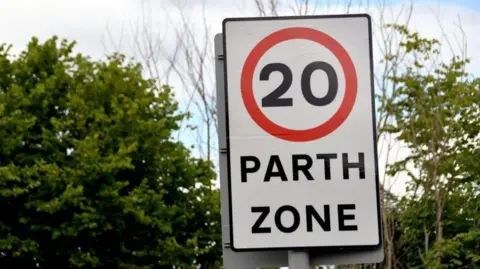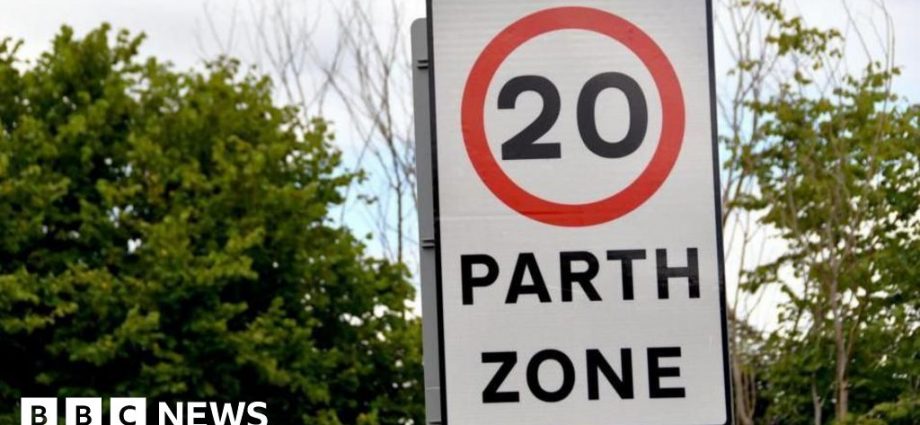BBC News
 Getty Images
Getty ImagesMore than 100,000 drivers in Wales have been caught breaking the 20mph speed limit, according to new data.
The latest data from GoSafe reveals 112,699 offences were committed up to March 2025 since the introduction of the default speed limit in September 2023.
Luca Straker, campaigns manager for road safety charity Brake, said the evidence was clear that where speed limits were lowered there were fewer deaths.
But drivers still remain divided about whether the reduced limit was necessary, with some admitting to frequently breaking the limit, while others said the rest of the UK should follow suit.
The highest speed recorded was 89mph in January 2025 but the average speed was most often about 28mph, according to road safety partnership GoSafe.
The number of speeding motorists appeared to peak last summer with 7,958 offences recorded in north Wales and 7,326 in mid and south Wales in August.
The most recent figures show the number was lower in March 2025, with 4,950 offences recorded in north Wales and 4,128 in mid and south Wales in the same month.
GoSafe published the monthly total of speeding offences in 20mph areas, as well as the highest and average speed.
Driver Georgie Bennett, 31, from Cardiff, said trying to get anywhere in the city centre had become “really difficult” as traffic was bad already.
“I just don’t think it [20mph] is necessary, I don’t think it’s necessary at all,” she said.
“I get it outside schools, hospitals, where elderly people live, I get that. But there are so many places where it just doesn’t need to be a thing, it just holds up so much traffic.”

Ms Bennett said she had seen people going over the limit in 20mph zones and said there was no policing of the reduced speed.
“If you’re not going to police the thing you’re putting into place then what’s the point in doing it, as people are just going to ignore it anyway.”

Valerie Banner, 81, from Gloucester, said 30mph in a built-up area was too fast and she was “all for slowing down”.
Her partner, Derek Knight, 77, also agreed and said “there should be a nationwide 20mph limit”.
“I think all urban areas should be 20mph, any estate or inner city and that’s it.”
Katie from Cardiff said the lower limit was a good idea, as the evidence suggested it was reducing accidents, which would be positive for the NHS.
“I think in the long run, if it saves lives then it’s saving costs for the NHS and that is going to save a lot more than changing some signs,” she said.
“People will always push above what you give them, if you give them 20 and they do 25, that’s still better than giving then 30 and them do 35.”

Maria de Andrade, from Pontprennau, Cardiff, admitted to going over the limit and was not surprised people had been caught breaking the limit.
She said traffic was worse since the change.
“In certain areas I can understand why they have applied it, but there are certain areas where it isn’t really necessary.”
“It confuses a lot of people on the roads, you don’t know if you should be going 20 [mph] or if you should be going 30.”

Rhiannon Lloyd, Swansea University student from Newbury, West Berkshire, said she did not think the speed limit was “completely effective as “not a lot of people are abiding by it”.
Fellow Swansea University student, Amy John, 19, said while many ignored the lower limit, the roads were a lot safer for pedestrians.
In 2022, the Senedd voted to make Wales the first nation in the UK to adopt 20mph as the default speed limit on restricted roads.
The 20mph default came into effect in September 2023 but has proved controversial, with a petition opposing the change receiving a record-breaking number of signatures.
The public backlash prompted a review of the policy, and councils were currently considering whether more roads could be switched back to 30mph.
Enforcement over the limit began in January 2024, with roadside teams using speed monitoring equipment to catch offending motorists.
Currently, drivers are subject to enforcement at 26mph or over where a 20mph limit applies.
Luca Straker, campaigns manager for road safety charity Brake, said death and serious injuries reduced on roads that had a speed limit of 20mph.
“The evidence is clear. In places where speed limits have been lowered, we see fewer collisions, and fewer deaths and serious injuries – and Wales has proven this again when collisions reduced by 26% after the implementation of 20mph as a default speed limit.”



